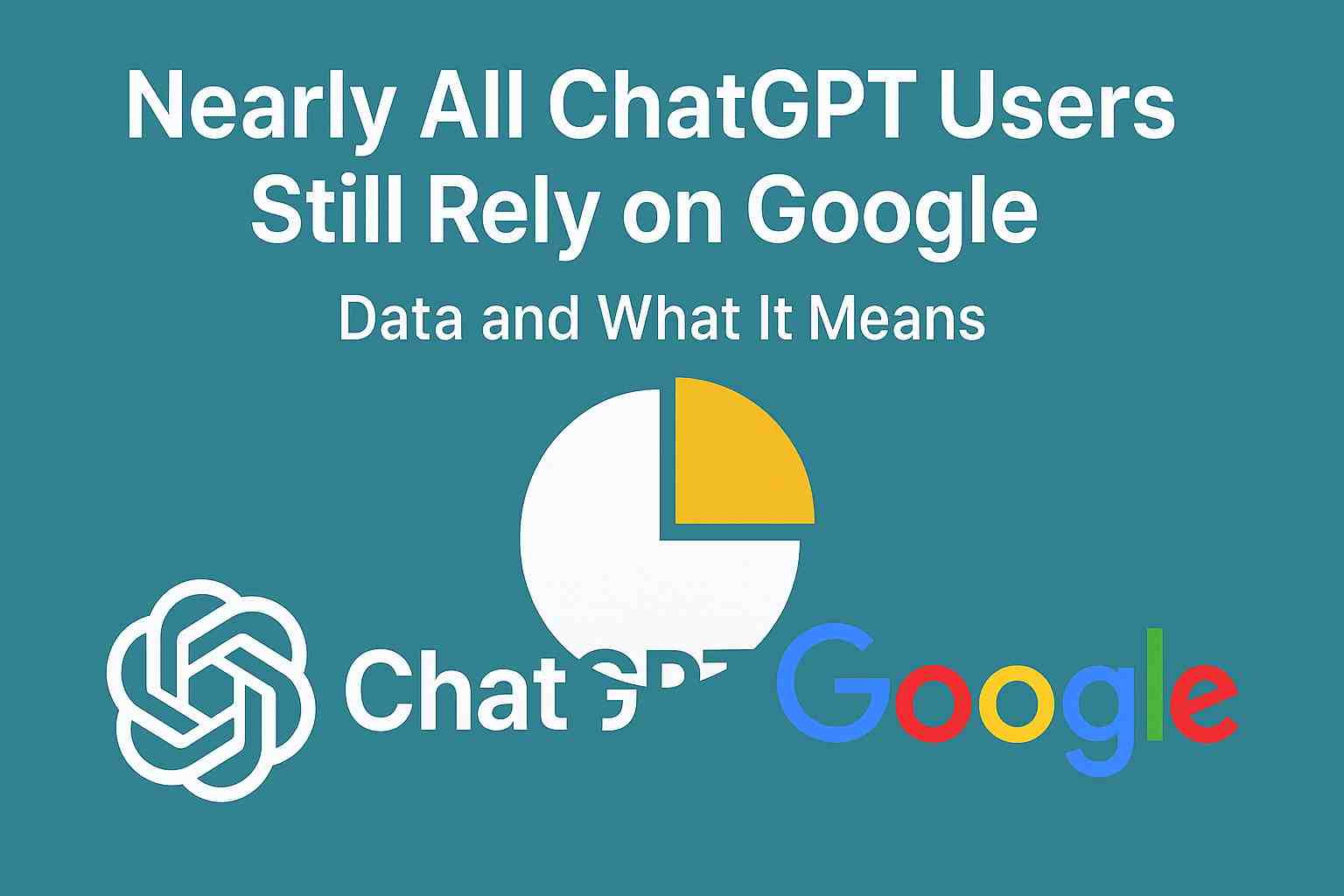Introduction
Have you ever begun a search with ChatGPT and then ended up opening a Google tab anyway? You’re not alone. Despite how helpful AI is getting, fresh data shows almost every ChatGPT user still goes to Google.
This is a big deal for anyone creating content, running SEO campaigns, or trying to figure out if tools like ChatGPT will replace Google in how people seek information. If Google continues to dominate even in the age of AI, then content strategy, search engine optimization, and digital behaviour still depend heavily on Google.
What exactly does the data show about ChatGPT and Google usage?
Recent metrics reveal:
- Around 95% of ChatGPT users also visited Google within the same timeframe.
- Only a small fraction of Google users (about 14–15%) show up in ChatGPT usage stats.
This suggests nearly universal overlap: nearly all users of ChatGPT still rely on Google.
Why does this matter right now in SEO and digital marketing?
Because the rise of ChatGPT hasn’t dethroned Google even with all its AI flair. What this means for marketers:
- SEO is still very relevant, even as tools like ChatGPT become more prevalent.
- Search intent, ranking, keywords, backlinks, and content freshness aren’t dead; they’re just sharing space now with AI tools.
- Brands need to adapt; people may first ask ChatGPT but then verify, explore, or dig deeper via Google.
How are people using ChatGPT and Google together?
Here are patterns emerging (via reports and insights):
Do people stop using Google once they adopt ChatGPT?
Not at all. The data supports what many researchers call the complementary usage model: ChatGPT augments search experiences rather than replacing them.
What kinds of queries lead people to prefer Google, and when is ChatGPT the go-to?
- People tend to use Google for recent events, news, varied viewpoints, or when they need sources.
- They lean on ChatGPT for summaries, explanations, ideation, or getting quick overviews.
- After using ChatGPT, many users still return to Google for verification.
What should content creators & SEO professionals do in response?
If I were consulting someone today, I’d suggest:
- Keep optimizing for Google Search good content, keyword research, fresh updates, pages that satisfy search intent.
- Incorporate content that works well in AI conversational formats (e.g. FAQs, summaries) while maintaining “deep dive” pieces for Google ranking.
- Ensure your content is trustworthy: cite sources, include recent info, use authoritative data.
- Monitor analytics: see where traffic is coming from, what content gets shared or referenced in AI tools or Overviews, etc.
What are the caveats or what the data doesn’t (yet) tell us?
- The stats don’t always reveal why people go to Google after using ChatGPT. Motivation and context vary.
- ChatGPT’s knowledge tends to lag for recent news or rapidly changing info, pushing users to Google.
- Usage doesn’t always equal trust or decision-making. Someone might consult ChatGPT first, but act based on something found via Google.
- The landscape is still shifting. As AI models improve (e.g. better web access, real-time updates), patterns might evolve.
FAQ
Q: Will I get better traffic focusing only on content optimized for ChatGPT-style queries?
A: Probably not. You’ll miss out on the majority of people who still use Google for discovery, detailed research, and verification.
Q: Does this mean Google Overviews or AI search will replace traditional search results?
A: Not yet. Those features are growing, but Google still delivers pages, links, full articles and people use them.
Q: Should I change my keyword strategy because of this data?
A: I’d tweak rather than overhaul. Keep doing keyword research, include conversational long-tail queries, but don’t abandon fundamentals.
Q: Are younger audiences more likely to skip Google and use ChatGPT more exclusively?
A: Possibly, but data so far shows overlap even among younger users they often use both.
Q: How can I measure whether my content is being used by ChatGPT or AI tools?
A: That’s tricky. You can look at content visibility, shared excerpts, traffic from search terms, maybe surveys. But direct measurement is still limited.
Conclusion
There you have it: nearly all ChatGPT users continue to depend on it and Google search. What it says to us is that AI hasn’t replaced the search, but it’s indeed reshaping how we search. For businesses, content producers, and SEO people, the strategy must be: optimize for Google, adapt for AI, and maintain trust.
